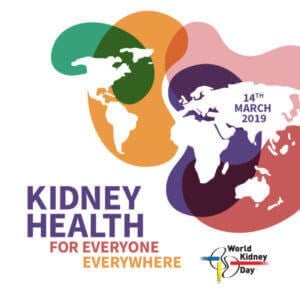Check-up on your Kidneys for National Kidney Month!
March is National Kidney Month
 National Kidney Month is an excellent time for a kidney check-up! Did you know that over 30 million Americans have some form of kidney disease? Did you know that 9 out of 10 people will have no symptoms? Let's raise awareness about kidney disease for World Kidney Day on March 14th. Kidney disease is very common, and effects about 850 million people around the world.
National Kidney Month is an excellent time for a kidney check-up! Did you know that over 30 million Americans have some form of kidney disease? Did you know that 9 out of 10 people will have no symptoms? Let's raise awareness about kidney disease for World Kidney Day on March 14th. Kidney disease is very common, and effects about 850 million people around the world. 
There are 5 stages of kidney disease and the 5th stage usually requires kidney replacement therapy (Dialysis or Transplantation). Let's focus on slowing down kidney disease in the earlier stages, by treating the underlying conditions.
Questions for your Doctor
Start by asking your Doctor, “Are my kidneys normal, and have I been tested for Kidney Disease”. If you have diabetes, high blood pressure, or a family history of kidney failure, then you are at risk for kidney disease. A simple blood test and a urine test can reveal your kidney health, and the percentage that your kidneys are functioning.
Ask your Doctor “How often should I be checked for kidney disease?” Some conditions require more frequent checks-up than others. Tests may include blood, urine, tests, and often imaging of the kidneys. Also, a good family history is important, as well as a list of all medications.
Lastly, ask your Doctor “What should I do to keep my Kidneys Healthy”. Kidney disease is caused by Diabetes and High Blood pressure over 70% of the time. The remaining third of cases are caused by inflammatory/infectious or auto-immune diseases, repeated urinary tract infections, obstruction, medications, and other less common conditions.
As a Nephrologist (Kidney Doctor) that treats patients with Kidney Disease, a common question I hear from patients is “What can I eat or drink at home to help my kidneys”. So, I explain that diet will change depending on their level of kidney function, but there are great ways to take action today.
Things everyone can do for great kidney health.
 1) Avoid sodas, and other carbonated beverages. These drinks often contain phosphoric acid, which is easily absorbed and can gradually worsen kidney function. 2) Choose fresh over processed meats whenever possible. Processed meats often contain more phosphate additives, which leads to additional problems such as bone loss and a more rapid decline in kidney function. 3) Eat less fast and pre-packaged food. These foods typically contain more salt, sugar, and preservatives compared with cooking meals at home. Pack your own snacks in Ziplock bags, whenever possible. 4) Eat more vegetables, and fruits. Choose green vegetables, since they are lower on the glycemic scale and also eat a variety of colors. For dessert, reach for fresh fruits like berries, apples, peaches, and plums. Your Doctor will let you know if you have to limit higher potassium foods, especially if your kidney function is very reduced. 5) Drink less sugary drinks, and eat fewer desserts. Diabetes is still the leading cause of kidney failure. 25% of Diabetics have some form of kidney disease. Choose water as your drink of choice, and limit excess sweets and added sugars. Start by cutting your current intake in half today.
1) Avoid sodas, and other carbonated beverages. These drinks often contain phosphoric acid, which is easily absorbed and can gradually worsen kidney function. 2) Choose fresh over processed meats whenever possible. Processed meats often contain more phosphate additives, which leads to additional problems such as bone loss and a more rapid decline in kidney function. 3) Eat less fast and pre-packaged food. These foods typically contain more salt, sugar, and preservatives compared with cooking meals at home. Pack your own snacks in Ziplock bags, whenever possible. 4) Eat more vegetables, and fruits. Choose green vegetables, since they are lower on the glycemic scale and also eat a variety of colors. For dessert, reach for fresh fruits like berries, apples, peaches, and plums. Your Doctor will let you know if you have to limit higher potassium foods, especially if your kidney function is very reduced. 5) Drink less sugary drinks, and eat fewer desserts. Diabetes is still the leading cause of kidney failure. 25% of Diabetics have some form of kidney disease. Choose water as your drink of choice, and limit excess sweets and added sugars. Start by cutting your current intake in half today.
Share this message with someone for National Kidney Month! ![]()
Remember, a kidney-healthy diet is also heart-healthy, brain-healthy, and an overall healthy lifestyle change that may add years to your life. Don't forget to add in regular exercise for a winning combination!
Dr. Karla Vital is a Board-Certified Nephrologist and Bariatric Medicine Physician who is accepting new patients at Vital Health and Wellness Center in Houston, Texas. Call today to schedule an appointment. Stay connected on Facebook at https://www.facebook.com/vitalhealthandwellness/. Read more about National Kidney Health at http://www.kidney.org

